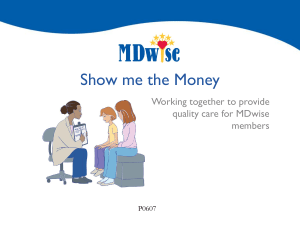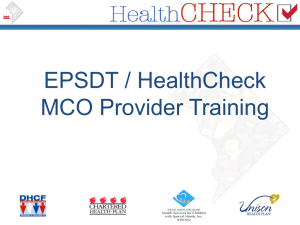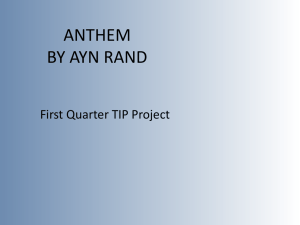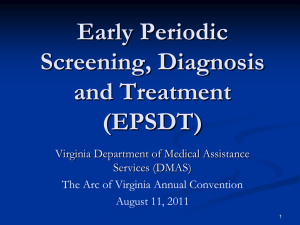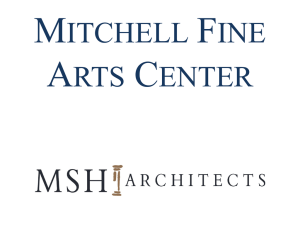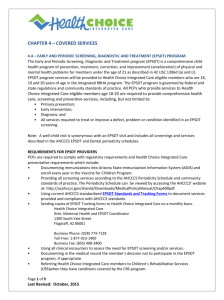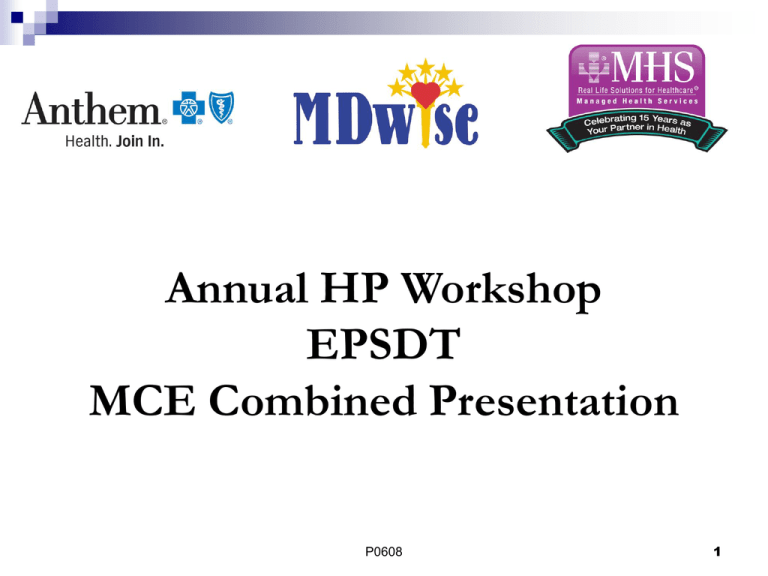
Annual HP Workshop
EPSDT
MCE Combined Presentation
P0608
1
EPSDT – Screening Components
The following components of a screening must be provided and documented to provide
quality care to the members and receive enhanced reimbursement:
Health and developmental history, including assessment of physical and mental
health development
Unclothed physical exam
Nutritional assessment
Developmental assessment
Vision observation at each screen and direct referral to an optometrist
Hearing observation at each screen and objective testing with audiometer at 4 years
old
Dental observation at each screen and direct referral to a dentist starting at 6 – 12
months old
Laboratory tests, including blood level assessment appropriate for age and risk
factors
Immunizations administered or referred, if needed at time of the screen
Health education, including anticipatory guidance
This is often provided, but frequently not documented.
P0608
2
EPSDT – MCE Billing
The following billing procedures must be followed to permit correct reimbursement.
Every claim for a HealthWatch/EPSDT visit must be coded with the following:
The appropriate patient examination code (99381 – 99385, and 99391 – 99395) must
be included on the first detail line of the medical claim form.
The preventive health diagnosis code, V20.2, as the Primary diagnosis.
Physicians are strongly encouraged to include all applicable diagnosis codes and
procedure codes on the claim form.
The usual and customary appropriate EPSDT reimbursement rate for the initial or
established patient exam should be billed. The enhanced reimbursement rate is $75
for codes 99381 – 99385 and $62 for codes 99391 – 99395.
Providers must provide all components of the EPSDT program to submit for the
enhanced reimbursement.
Providers must report on the claim form all screens and immunizations
administered during the HealthWatch/EPSDT visits.
P0608
3
EPSDT – MCE Billing Vaccines
The MCE’s follow HP guidelines and reimburse Vaccines for Children (VFC) services for
the administration fee.
The VFC fee is a maximum of $8.00 or lower of the submitted charge from the provider.
For appropriate claims submission for $8.00 reimbursement, V20.2 is submitted as the
primary diagnosis code.
A list of covered VFC available vaccines, visit the EPSDT HealthWatch Provider Manual
at the IHCP Web site under Section 3, General VFC Billing Information.
HEDIS guidelines and the Periodicity and Screening Schedule provide guidelines, and
recommended timelines for immunizations for members.
Providers should utilize CHIRP to record, manage, and tally immunizations for their
office.
P0608
4
EPSDT – MCE Billing
If a patient is evaluated and treated for a problem during the same visit as an
EPSDT annual exam or well – child service, the problem oriented exam can be
billed separately accompanied by the 25 modifier (separate significantly
identifiable E&M service). The problem must require additional moderate
level evaluation to qualify as a separate service on the same date.
FQHC’s and RHC’s – Providers should NOT use the T1015 encounter code in
addition to the CPT or HCPCS codes when billing MCEs. These providers
should bill the appropriate EPSDT services provided to the member.
P0608
5
EPSDT – Missed Appointments
If a member misses a well – child appointment, the office should reach out to
the member and reschedule the visit.
The provider office can also reach out to the MCE for additional member
education.
Provider offices should take every opportunity to educate a member, provide
preventive care, and immunizations per the screening schedule as early
detection and treatment help prevent diseases in members.
P0608
6
HEDIS Measures
Each MCE will help providers focus on the EPSDT program in conjunction with the HEDIS well –
child measures for the following performance measures:
Well – Child Visits 0 – 15 Months
Frequency of Visits
Health and Developmental history, physical and mental
Health Education and Anticipatory Guidance
Well – Child Visits 3 – 6 Years
Annual well – child visit
Health and Developmental history, physical and mental
Health Education and Anticipatory Guidance
Well – Child Visits 12 – 21 Years
Annual well – child visit
Health and Developmental history, physical and mental
Health Education and Anticipatory Guidance
*Please see 2010 HEDIS Performance Measure poster for additional details on MDwise well –
child and additional performance measures.
P0608
7
EPSDT – Lead Screening
Lead poisoning is preventable. Children from 9months to 6 years are at
greatest risk for elevated blood levels.
Ensure lead screenings are a part of a well – child exam.
If children are identified with elevated lead levels, ensure they have
recommended follow – up treatment.
Codes for billing lead screenings are the following:
83655 – U1
83655 – U2
83655
P0608
8
EPSDT – Documentation
It is imperative when member receives all components of the EPSDT program, that the
services are documented and incorporated into the members medical chart.
A provider should document the family and medical history:
Reason for visit
Initial observation
Perinatal history
Nutritional status
Developmental history
Medical history
Body system review
Family health history
Referrals must be documented and recorded in the member’s medical chart.
Anticipatory guidance provided during the EPSDT visit and/or the well – child visit must
be documented in the member’s medical chart.
P0608
9
EPSDT – Documentation
A provider should perform the following during an EPSDT exam:
Measurements
Height
Weight
Weight for height/BMI
Head circumference
Blood pressure
General physical examination of the systems
Screenings for referrals
*Please refer to the EPSDT Health Watch Manual for testing and referral charts.
P0608
10
Well – Child Services
If all components of the EPSDT program are not provided to the member, but the
following components are documented and provided, the provider can submit for well –
child services and not EPSDT services and not receive enhanced reimbursement:
Annual well – child visit
Health and Developmental history, physical and mental
Health Education and Anticipatory Guidance
The provider should submit the claim with the appropriate E&M procedure code and the
V20.2 diagnosis code.
The services will count towards the provider’s quality measures to receive credit for the
services provided and increase the measure.
P0608
11
Billing Scenarios
If a member presents for an EPSDT exam and all components were provided
and documented, submit a claim following these guidelines:
CPT
ICD – 9 Code
99391 – 99395
or
99381 – 99385
V20.2
P0608
12
Billing Scenarios
If a member presents for an EPSDT exam and all components were
provided and documented, and VFC immunizations were also provided,
submit a claim following these guidelines:
CPT Code
ICD – 9 Code
99391 – 99395 with the 25
modifier
or
99381 – 99385
V20.2
90707
V06.4
90716
V05.4
90721
V06.8
P0608
13
Billing Scenarios
If a member presents for an EPSDT exam and all components were
provided and documented, and a member complains of ear pain so they
are being seen for a sick visit, submit a claim following these guidelines:
CPT Code
ICD – 9 Code
99391 – 99395
or
99381 – 99385
V20.2
99201 – 99205 with the 25 modifier
or
99212 – 99215 with the 25 modifier
Appropriate diagnosis code for the visit.
P0608
14
Additional EPSDT Tips
By ensuring appropriate coding of the services that are provided, it will
demonstrate that the care being provided also meets quality measures.
Reimbursement can be maximized by correct coding.
Remember to submit charges if the member has third party liability (TPL).
Well child services can be billed for reimbursement when they do not include
all components of an EPSDT visit.
A comprehensive prenatal visit meets all of the requirements for a preventive
care visit and can be billed in conjunction with the V20.2 to count towards the
HEDIS measure.
By increasing EPSDT services, performance measures in the well – child
targeted measures will rise.
Complete the Notification of Pregnancy (NOP) to ensure the MCE’s are aware
of new member’s becoming pregnant and to ensure they receive the required
prenatal services.
P0608
15
Periodicity and Screening Schedule
P0608
16
Hoosier Healthwise Managed Health
Services (MHS) Interventions
MHS HEDIS Reporting and Material – MHS Team (Provider Relations and Quality
Improvement) mail quarterly scorecard information to PMP network, providing snapshot
of current metrics and listing of members identified as not receiving service to date to
aid in patient outreach.
MHS Education Sessions – MHS is holding workshops & individual sessions throughout
the State to assist our provider network in education regarding what is needed to achieve
goals.
Billing/Claims assistance – MHS team providing one on one education sessions with
office to provide instruction on appropriate EPSDT and HEDIS billing procedures.
Educational Material – MHS has developed and issued education material such as
HEDIS Quick Reference Guide and Healthwatch (EPSDT) chart tool.
Connections Representatives – A team dedicated to providing one-on-one education for
members with compliance issues (i.e. missed appointments, ER utilization, etc.)
In addition, the Quality Outreach Team provides telephone follow-up on EPSDT/Well
Child mailings assisting members with obtaining appointments and arranging
transportation if needed.
P0608
17
Hoosier Healthwise Managed Health Services (MHS)
Interventions
P0608
18
Hoosier Healthwise Managed Health Services
(MHS) Interventions
P0608
19
Members Needing Service
P0608
20
Service Needing Members
P0608
21
P0608
22
Hoosier Healthwise Anthem Interventions
Anthem Education – Anthem’s NERs, Outreach, Health Promotions
staff assist in educating providers on a one on one basis related to
HEDIS, EPSDT guidelines, and documentation standards.
Educational Materials –Anthem’s educational materials consist of the
HEDIS Measure Physician Documentation Guidelines and
Administrative Codes brochure to assist physicians in identifying the
criteria/requirements for services and the elements of documentation
needed for each visit. Anthem provides age appropriate forms to
providers promoting anticipatory guidelines, growth and development,
and physical and mental health exams.
Anthem provides P4P brochures to providers as a baseline regarding
measures scored per HEDIS, as well as individual provider scores
implementing continuous plans for improvement.
P0608
23
Hoosier Healthwise Anthem Interventions
Anthem Reports – Anthem provides Gap in Care reports to physicians
as an outreach effort to assist with getting members in for preventive
care.
Outreach – Anthem’s Outreach Specialists provide one on one
education, telephone and home visits to members per provider request
or those needing assistance with getting in to see their PMPs,
transportation services, missed appointments, ER usage, etc.
Anthem Outreach Specialists have clinic days arranged to target and
educate members in need of preventative care.
Anthem Webinars – Anthem provides educational webinars to assist
providers in gaining knowledge of the required measures, billing
guidelines, and documentation needed to increase their HEDIS scores.
P0608
24
Anthem - Age Appropriate Documentation Form
for Well Visits 3-6 Years
Areas covered with the form:
•
Nursing Intake
•
Interval History
•
Growth – Development
•
Parental/Patient Concerns
Name:_______________________________________________
DOB: _________________________ Actual Age: ___________
Language Spoken____________
Interpreter Name ____________
Date: ______________________________
4 - 5 YEARS
NURSING INTAKE
Height:
Weight:
BMI:
BMI%:
BP:
Temp.:
Pulse:
Resp.:
Allergies:
Growth Charts Completed: [ ]
Abuse: Witness or Victim:
Notes:
Alternate health care provider:
MA Signature
Fatigue, nightmares, enuresis, wt. loss or gain:
INTERVAL HISTORY
Diet:
Has WIC: Yes / No
Stools:
Illnesses:
Sleep Pattern:
Seeing dentist: Yes / No
Accidents:
Family history: HTN, heart disease, high cholesterol, DM, asthma
Meds./Vits.:
Exposure to tobacco smoke:
TB Risk: Yes / No
GROWTH-DEVELOPMENT: Physical activity:__________________________
[ ]
Hops on one foot
[ ]
Plays with several children
[ ]
Counts 4 pennies
[ ]
Recognizes 3-4 colors
[ ]
Copies a square
[ ]
Knows opposites
[ ]
Catches, throws a ball
[ ]
Knows name, address, phone no.
PARENTAL/PATIENT CONCERNS:
PHYSICAL EXAMINATION
•
Physical Examination
•
Assessment
•
Plan
•
Orders
•
Anticipatory Guidance
General Appearance [
[
Head [
Eyes [
[
[
Ears [
[
Nose [
Mouth & pharynx [
Neck [
ASSESSMENT:
]
]
]
]
]
]
]
]
]
]
]
Well nourished and developed
No abuse/neglect evident
Symmetrical
Conjunctivae, sclerae, pupils normal
Red reflexes present
Appears to see [ ] No strabismus
Canals clear, TMs normal
Appears to hear
Passages patent
Normal color, no lesions, no cavities
Supple, no masses palpated
Teeth
[
]
Grossly normal, no cavities
Heart
Lungs
Abdomen
Genitalia: Male
[
[
[
[
[
[
[
[
[
[
[
]
]
]
]
]
]
]
]
]
]
]
No murmurs, regular rhythm
Breath sounds normal bilaterally
Soft, no masses, liver & spleen normal
Normal appearance, circ./uncirc.
Testes in scrotum
No lesions, nl external appearances
Good abduction
Present and equal
No deformities, full ROM
Clear, no significant lesions
Alert, moves extremities well
Female
Hips
Femoral pulses
Extremities
Skin
Neurologic
PLAN:
ORDERS: [ ]Vaccine reactions, risks and follow-up explained / VIS sheet given
[ ] DTAP
[ ] UA at 5 years
[ ] MCV4 (high risk)
[ ] IPV
[ ] Vision screening Yearly
[ ] PPD
[ ] Hep B (if not previously done)
[ ] Audiometry at 4 and 5 years
[ ] MMR
[ ] Lead Blood Test (if not in chart)
[ ] Varicella (second dose)
[ ] WIC Referral given
[ ] Hep A (if not previously done)
[ ] Dental Referral given
[ ] HCT (if high risk)
[ ] Rx for fluoride drops/chewable tabs .50/1.0 QD till age 14
[ ] Influenza vaccine (check recommendations)
[ ] Immunization Registry entry
[ ] Fluoride varnish application
[ ] Lipid Profile (if high risk)
ANTICIPATORY GUIDANCE: Circle if discussed
Diet: Regular balanced meals with snacks, caloric balance, sweets, Fe, Na, meal socialization, school lunch program
Injury & Violence prevention: Street dangers, knives, falls, drowning, caution with strangers, smoke detector, hot water temp.,
Window guards, pool fence, bike helmet, poison center phone, storage of drugs, toxic chemicals, matches, and guns, burns, lead
poisoning prevention
Education on Fluoride varnish treatment.
Guidance: Knows name, address, phone no., plays with other children, imitates adults, honest & simple answers regarding sex,
dressing self, B&B problems, school plans, TV programs, play supervision, regular exercise, UV skin protection, dentist Q 1 yr, tooth
care, parent smoking, strangers, school readiness , seat belt use, childcare plan, emergency care plan, physical activity, sun screen
[ ] Refer to appropriate agency.
Next appointment [ ] 1 year or________________ Signature ____________________________ Date ____________________
P0608
25
Anthem - Age Appropriate Documentation Form
for Adolescent 12-21 Years
Name:_______________________________________________
DOB: _________________________ Actual Age: ___________
Language Spoken____________
Interpreter Name ____________
Date: ______________________________
13 - 14 - 15 - 16 YEARS
NURSING INTAKE
Height:
Weight:
BMI:
BMI%:
BP:
Temp:
Pulse:
Resp.:
Allergies:
Growth Charts Completed: [ ]
Abuse: Witness or victim:
Notes:
Alternate health care provider:
MA Signature
Meds/Vits.:
LMP:
INTERVAL HISTORY ( indicate alone or with parent)
Diet:
Weight loss/gain:
Menarche:
Appetite:
Physical Activity:
TB risk: Yes / No
Exposure to tobacco smoke:
Accidents:
Seeing dentist: Yes / No
Tobacco/alcohol/drug use:
Family history: HTN, heart disease, high cholestero1, DM, asthma
Sexual activity:
Illnesses, stomach, headache, fatigue, depression:
GROWTH/SCHOOL PROGRESS: Physical activity:___________________________Risk questions should be asked for all ages.
Achievement, sports, peer relationships, attendance, hobbies, school vision or hearing problem, attendance, after high school plans :
PARENTAL/PATIENT CONCERNS:
PHYSICAL EXAMINATION
General Appearance [ ] Well nourished and developed
[ ] No abuse/neglect evident
Head [ ] No lesions
Eyes [ ] PERRL, conjunctivae & sclerae clear
[ ] Vision grossly normal
Ears [ ] Canals Clear, TMs normal
[ ] Hearing grossly normal
Nose [ ] Passages clear, MM pink, no lesions
Teeth [ ] Grossly normal
Neck [ ] Supple, no masses, thyroid not enlarged
Chest [ ] Symmetrical
Heart [ ] No organic murmurs, regular rhythm
ASSESSMENT:
[
[
[
[
[
[
[
[
]
]
]
]
]
]
]
]
[
]
Pap done
[
[
[
[
[
[
[
[
[
[
[
[
]
]
]
]
]
]
]
]
]
]
]
]
No masses, Tanner stage I II III IV V
Clear to auscultation bilaterally
Soft, no masses, liver & spleen normal
Grossly nl, Tanner stage I II III IV V
Circ./uncirc. [ ] Testes in scrotum
No lesions, nl external appearances
Normal
No deformities, full ROM
Not enlarged
No scoliosis
Clear, no significant lesions
Alert, no gross sensory or motor deficit
[
[
[
[
[
[
[
[
]
]
]
]
]
]
]
]
Immunization registry entry
Vision screening (objective at 15 yrs)
Audiometry (objective at 15 yrs)
Dental Referral given
[ ] HPV ( if not up to date)
[ ] UA(yearly)
[ ] PPD
[ ] Lipid profile (if high risk)
Rx for fluoride .50/1.0 mg QD till age 14.
Rx. For Folic Acid .4 mg qd. (if female)
Pap, GC, Chlamydia, VDRL (if sexually active)
Counsel re HIV (test if at risk)
ANTICIPATORY GUIDANCE: Circle if discussed
Diet: Fat (esp. sat. & chol.), Na, Fe, Ca, caloric balance, appropriate weight, junk food, eating disorders, physical activity.
Accident prevention: Safety helmet, risk-taking behavior, DUI, guns, violent behavior, motor vehicle safety, work safety.
Guidance: Smoking, alcohol, marijuana, cocaine, IV and other drugs, depression, suicidal ideation, puberty progress, sun screen, sex
education (partner selection, condoms, contraception, AIDS risk factors), goals in life, family interaction, exercise, physical activity,
seat belt use , self breast exam , testicular self exam, personal development : physical, growth, sexuality, independence
[ ] Refer to appropriate agency.
[ ] Refer to Drug/ ETOH rehab, stop smoking class, OB/Gyn service, mental health services or other________________________
Next appointment: [X] 1 year or
• Interval History
• Parental/Patient Concerns
• Physical Examination
• Assessment
[ ]Vaccine reactions, risks and follow-up explained /VIS sheets given.
Hep B (if not given previously)
MMR (if not up to date)
Varicella, (if not up to date or history date documented)
Hep A (if not given previously)
HCT (once between 11 to 21 years)
MCV4 @ 15 years (if not up to date)
Influenza vaccine (check recommendations)
Td/Tdap (if not up to date)
• Nursing Intake
• Growth – Development
Female
Breast (female)
Lungs
Abdomen
Genitalia
Male
Female
Femoral pulses
Extremities
Lymph nodes
Back
Skin
Neurologic
PLAN:
ORDERS:
Areas covered with the form:
MD Signature:
• Plan
• Orders
• Anticipatory Guidance
Date_________________
P0608
26
Clinical Quality Compliance
Administrators for Anthem
Acquanetta McKinney, CQA RN BSN
acquanetta.mckinney@anthem.com
(219) 796-9543
Tamela Queen, CQA RN PLNC
tamela.queen@anthem.com
(812) 469-7540
P0608
27
Hoosier Healthwise MDwise Interventions
MDwise Member Advocates - MDwise Member Advocates provide one
– on – one education and telephone outreach with members with
special needs or compliance issues (e.g. missed appointments, PMP
conflicts, ER utilization, etc.) or those who are not accessing their
PMP.
Billing guidelines – To help prevent coding problems, providers are
encouraged to refer to the MDwise educational materials and the
Indiana Medicaid supplemental manual on EPSDT @Indiana
Medicaid Website:
http://www.indianamedicaid.com/ihcp/Manuals/Other/EPSDT_He
althwatch.pdf
P0608
28
Hoosier Healthwise MDwise Interventions
MDwise Education – MDwise along with its Network Improvement team, and
Delivery Systems (Reps and Quality Management staff) will work one on one
with providers to educate on EPSDT and HEDIS to ensure specific goals are
met.
Created to take improvement efforts to a higher level
Educating providers on HEDIS and ROQ standards.
Providing providers information about their quality performance
Diagnose office practices that may result in missed opportunities to provide care or
cause services to not be billed correctly
Creating and distributing reference/educational materials and tools
Educational Materials – MDwise has developed education materials such as
the HEDIS poster, the well – child campaign and flyers for providers and office
staff to help promote early detection and treatment.
Reports – MDwise Delivery Systems will provide it’s PMP’s reports that will
identify members who are delayed in their check ups.
P0608
29
Converting Acute Visits to Well
Visits
P0608
30
Hoosier Healthwise MDwise Reports
Measure
Eligible
Members
Current Current %
90th
Numerator
Meets
Percentile
Vol. Mbrs.
Potential % Vol. Needed
Missed Opp.
Meets
for 90th
% of Opportunity
Needed
W34
2,996
1,380
46.1%
79%
1254
87.9%
987
79%
AWC
3,239
747
23.1%
57%
1308
63.4%
1099
84%
Note: Data is based on dates of service 1/1/09-12/31/09 with claims paid through 11/30/09 captured.
P0608
31
Hoosier Healthwise MDwise Reports
DS
Practice
0
0
% Meet
Criteria
100.0%
Meet
Criteria
LDL-C Screening
F/U Care for Children Prescribed ADHD Meds
Initial Phase
Follow-up After Hospitalization for Mental Il
Follow-up Within 7 Days of Discharge
0
0
0
0
0
Timeliness of Prenatal Care
Meet
Criteria
0
0
100.0%
0
0
100.0%
0
0
0
100.0%
0
0
0
100.0%
Timeliness of Postpartum Care
0
0
Frequency of Prenatal Care >81%
Well-Child Visits in First 15 Mths of Life
Six or More Visits
0
0
Well-Child Visits - Ages 3-6
0
Adolescent Well-Care Visits
0
0
0
#DIV/0!
0
0
#DIV/0!
0
0
0
#DIV/0!
0
0
0
#DIV/0!
100.0%
0
0
0
100.0%
0
0
100.0%
0
0
100.0%
0
0
100.0%
0
Denom
inator
Meet
Criteria
0
0
LDL-C Screening
F/U Care for Children Prescribed ADHD Meds
Initial Phase
Follow-up After Hospitalization for Mental Il
Follow-up Within 7 Days of Discharge
0
0
0
0
0
Timeliness of Prenatal Care
Meet
Criteria
Denom
inator
Meet
Criteria
Doc3
0
0
% Meet
Criteria
0%
0%
0
0
0%
0
0
0
0%
0
0
0
0%
#DIV/0!
0
0
0
#DIV/0!
0
0
#DIV/0!
0
0
#DIV/0!
0
0
#DIV/0!
0
Practice
% Meet
Criteria
100.0%
Denom
inator
0
0
0%
0
0
0%
0
0
0
0%
0
0
0
0%
0%
0
0
0
0%
0
0
0%
0
0
0%
0
0
0%
0
Doc5
% Meet
Criteria
Meet
Criteria
Meet
Criteria
Doc4
% Meet
Criteria
0%
Denom
inator
0
0
% Meet
Criteria
0%
0%
0
0
0%
0%
0
0
0%
0
0%
0
0
0%
0
0
0%
0
0
0%
0%
0
0
0%
0
0
0%
0
0%
0
0
0%
0
0
0%
0
0%
0
0
0%
0
0
0%
0
0%
0
0
0%
0
0
0%
0
0%
0
0
0%
0
0
0%
0
0
% Meet
Criteria
0%
Doc6
0
0
% Meet
Criteria
0%
100.0%
0
0
100.0%
0
0
0
100.0%
0
0
0
100.0%
Timeliness of Postpartum Care
0
0
Frequency of Prenatal Care >81%
Well-Child Visits in First 15 Mths of Life
Six or More Visits
0
0
0
Well-Child Visits - Ages 3-6
Adolescent Well-Care Visits
Measure
Cervical Cancer Screening
Denom
inator
Meet
Criteria
Doc2
% Meet
Criteria
0%
DS
Denom
inator
Doc1
% Meet
Criteria
#DIV/0!
Measure
Cervical Cancer Screening
Denom
inator
Denom
inator
Denom
inator
Doc7
0
0
% Meet
Criteria
0%
Denom
inator
0%
0
0
0%
0
0
0
0%
0
0
0
0%
100.0%
0
0
100.0%
0
0
0
100.0%
0
0
0
100.0%
0
0
100.0%
Meet
Criteria
Doc8
0
0
% Meet
Criteria
0%
0%
0
0
0%
0
0
0%
0%
0
0
0%
0
0
0%
0
0%
0
0
0%
0
0
0%
0
0
0%
0
0
0%
0
0
0%
0%
0
0
0%
0
0
0%
0
0
0%
0%
0
0
0%
0
0
0%
0
0
0%
0
0%
0
0
0%
0
0
0%
0
0
0%
0
0
0%
0
0
0%
0
0
0%
0
0
0%
0
0
0%
0
0
0%
0
0
0%
0
0
0%
P0608
Meet
Criteria
Meet
Criteria
Denom
inator
Meet
Criteria
Denom
inator
32
Hoosier Healthwise MDwise Reports
120%
100%
OMPP Target
80%
DS Totals
60%
Practice Totals
40%
20%
0%
CCS
CDC
ADD
FUH
P0608
PPC
PPC
FPC
W15
W34
AWC
33
Questions?
Thank You for attending!
P0608
34

